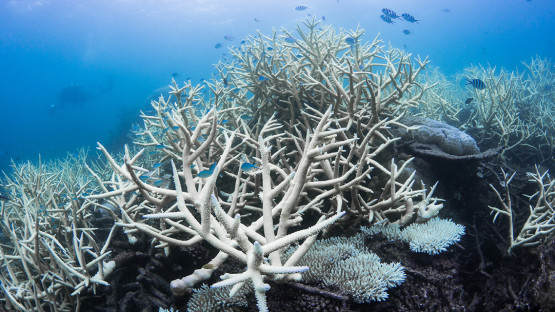Ocean Acidification Disrupts Marine Life, Especially Organisms with Calcium-Based Shells or Skeletons, Such as Corals and Mollusks (Photo: The Ocean Agency/Ocean Image Bank)
A new partnership agreement has been established to formalize the long-standing collaboration between the IAEA’s Marine Environment Laboratories, hosted by the Principality of Monaco, and the Prince Albert II of Monaco Foundation on ocean acidification and ocean-based climate change solutions. The agreement, signed by Olivier Wenden, Vice-President and Executive Director of the Foundation, and Najat Mokhtar, Deputy Director General at the IAEA, focuses on the joint work of the IAEA’s International Coordination Centre on Ocean Acidification and the Foundation’s « Ocean Acidification and other Ocean Change – Impacts and Solutions » (OACIS) initiative.
Ocean acidification occurs when the ocean absorbs carbon dioxide (CO2) released into the atmosphere by human activities. The ocean absorbs about 25% of anthropogenic CO2 emissions, leading to a series of changes in the chemistry of seawater, notably an increase in acidity. Ocean acidification has significant effects on marine life, particularly on organisms whose shells or skeletons are made of calcium, such as corals and mollusks. Combined with ocean warming and the phenomenon of oxygen depletion, these changes create complex and unpredictable problems for marine ecosystems.
Founded in 2006, the Prince Albert II of Monaco Foundation aims to protect the environment and promote sustainable development. Ocean acidification and ocean changes have been at the heart of its concerns since 2013, when it launched the OACIS initiative.
“Ocean acidification is a global issue, but its effects depend on local factors,” says Mr. Wenden. “This phenomenon will hit many regions of the world hardest, regions that may not have the resources or capacity to monitor and adapt. We are excited to team up with the IAEA’s Marine Environment Laboratories to help provide scientists worldwide with the knowledge and capabilities they need to study this problem.”
The OACIS initiative brings together key entities working on ocean acidification in the Principality of Monaco (the Prince Albert II Foundation, the Monegasque Government, the Oceanographic Museum, the Monaco Scientific Centre, and the IAEA’s Marine Environment Laboratories), as well as the Villefranche Oceanography Laboratory [National Centre for Scientific Research (CNRS) / Sorbonne University], the Institute for Sustainable Development and International Relations (IDDRI), and the International Union for Conservation of Nature (IUCN).
“The IAEA is delighted and proud to formalize its long-standing collaboration with the Prince Albert II of Monaco Foundation, a key player in marine conservation in Monaco and internationally, with whom we share the same values and interests. We look forward to continuing our work together to pool scientific data and information to fight ocean acidification and optimize our results, with the goal of helping IAEA Member States achieve sustainable progress,” says Ms. Mokhtar.

The issue of ocean acidification is addressed in the Sustainable Development Goals. It is included in Target 14.3, which urges countries to “[minimize] ocean acidification” and “[combat] its effects, particularly by strengthening scientific cooperation at all levels.” It is also covered in the new Global Biodiversity Framework of the Convention on Biological Diversity, under Target 8. However, the capacity to monitor and study the effects of ocean acidification on marine biodiversity remains largely insufficient in many regions of the world.
The IAEA’s International Coordination Centre on Ocean Acidification (OA-ICC) promotes international collaboration on this issue. It organizes training for countries, facilitates access to data and resources, and defines standard methods and best practices. The OA-ICC also works to raise awareness among stakeholders about the role nuclear and isotopic techniques can play in analyzing the effects of ocean acidification. Scientists at the IAEA’s Marine Environment Laboratories in Monaco use these techniques to study the consequences of ocean acidification and its interactions with other environmental stressors.
As part of this new partnership, the IAEA and the Foundation will jointly organize training and expert meetings to help countries study ocean acidification and take action, ensuring that research in this field is inclusive and participatory. They also plan to organize joint events to raise awareness among policymakers, resource managers, and other stakeholders about the latest research on ocean acidification and ocean-based solutions on the sidelines of key ocean gatherings, such as Monaco Ocean Week, the United Nations Ocean Conference, and related events to be held in Nice and Monaco in June 2025.
The partnership will also provide an opportunity to tackle plastic pollution together, another critical issue on which the Foundation and the IAEA are working, notably through the Agency’s flagship initiative on the matter, NUTEC Plastics.
In preparation for their upcoming joint activities, the two partners are organizing a session of the International Winter School on Ocean Acidification and Multiple Stressors for researchers new to this field. The session will take place at the IAEA’s Marine Environment Laboratories in Monaco from November 18 to 29, 2024.
Source: iaea



